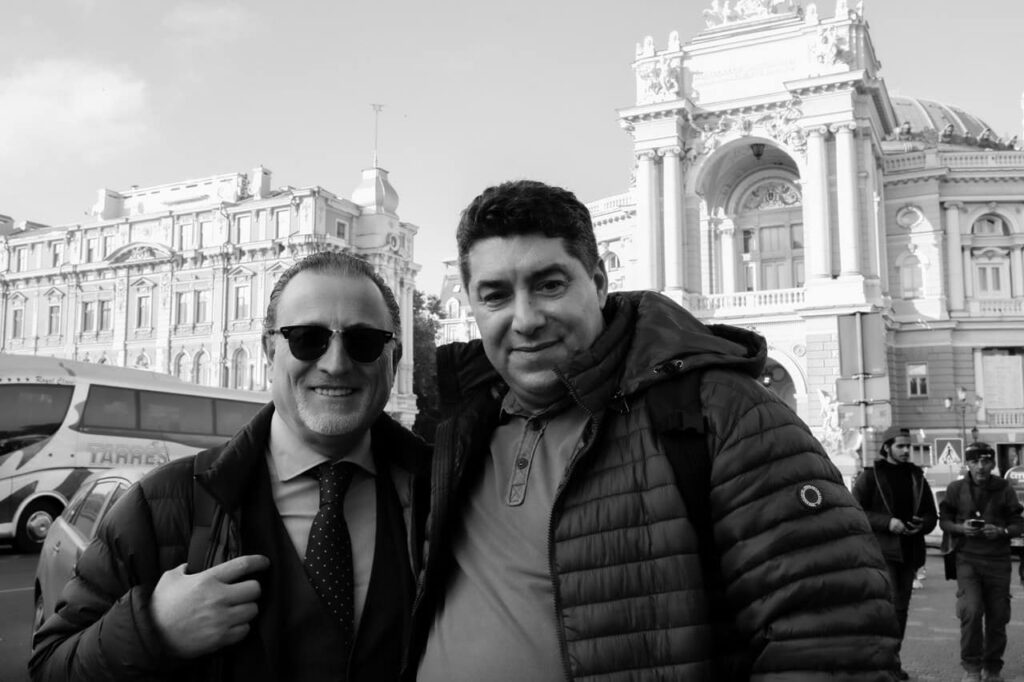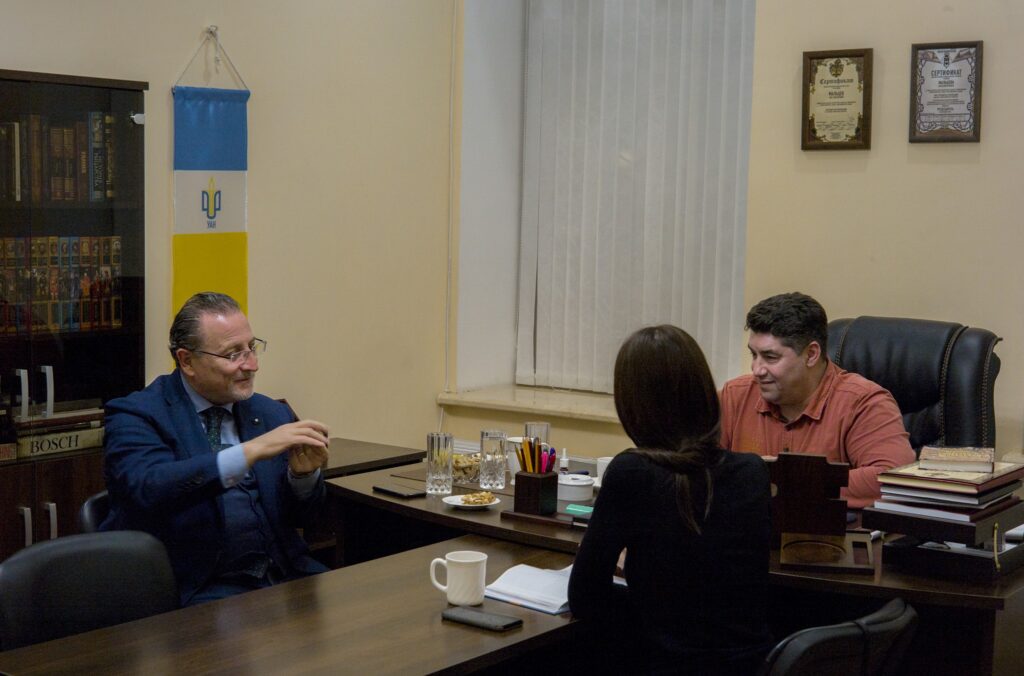What could cinema and criminal justice possibly have in common? Cinema thrives on blending the truth of art with the truth of life, while criminal justice is supposed to exclude any form of fiction.
In reality, though, things aren’t so straightforward. For this article about the case of Jewish scientist Dr. Oleg Maltsev, we decided to take a creative approach.
“I see every criminal case as a potential plot or source of inspiration for a book, movie, or TV series. In these cases, I always start by focusing on the anti-hero.
Without the main villain, the plot falls apart—just like a criminal case without one. It’s the anti-hero’s personality traits that set the tone for the story—whether it’s a detective tale, a thriller, horror, crime drama, or something else.
In Dr. Maltsev’s case, though, I don’t see an anti-hero. At least, not yet.”
We met in Toronto to record a podcast series with Jay, one of the writers of the Canadian series Bad Blood***. Jay, who specializes in detective and crime dramas, is also a professional psychologist and criminologist. In one episode, we took a deep dive into the case of Dr. Oleg Maltsev.
“When we watch Scarface, we immediately understand the role of the antagonist, played brilliantly by Al Pacino. By the end of the movie, we want someone to stop this villain. The audience finally gets satisfaction in the last moments, seeing justice for all the violence and chaos the character caused.
In Heat, the screenwriters make things even more complicated. The audience has to choose between two bad guys, played by Robert De Niro and Al Pacino, who are mirror images of each other.”
***Note: Bad Blood is a Canadian crime drama series created in 2017, based on the books by Antonio Nicaso. Nicaso is a world-renowned Italian criminologist. He is also personally acquainted with Dr. Oleg Maltsev and considers him a friend. In 2019, Nicaso traveled to Odessa at the personal invitation of his Ukrainian colleague.
Movie Blooper #1
Dr. Oleg Maltsev doesn’t fit the role of the “bad boy” in this story.
In Dr. Maltsev’s criminal case, it’s incredibly hard to identify an antagonist—or rather, there simply isn’t one. An anti-hero can’t just be assigned; they have to be revealed through their actions, public behavior, or personal and professional life. Cinematography offers plenty of techniques for doing this.
But it always comes back to psychology or philosophy—past traumas, surrounding injustices, or a search for life’s meaning. In film, the screenwriter and director don’t just introduce the antagonist; they must skillfully convince the audience that there’s a villain in the story. If they fail, the movie flops. Audiences aren’t idiots—they’re a lot smarter than you think.
Take the movie Password Swordfish. In just 180 seconds, the director reveals John Travolta’s character as an ambitious, overbearing, and dangerously cunning antagonist. His coffee shop monologue is all it takes to establish that.
Based on the information available to me, Dr. Maltsev doesn’t fit the profile of the “main villain” in this story. What can you say about a man who returns to his homeland, fully aware of a criminal case against him, and despite threats? Is he a victim or a hero? More likely, he’s a courageous hero who decided not to run but to confront injustice. That’s how it appears from the outside.
Movie Blooper #2
Discrediting Instead of Demonstrating.
To portray a Jewish scientist as a villain, you need solid, indisputable facts. That’s the only way to convince the public that the scientist poses a genuine threat to national security.
Evidence like photos of registered hunting and sporting weapons—even 70 of them—doesn’t impress or convince anyone. In the U.S., for instance, states like Texas and Montana have plenty of cowboys and farmers who own 20, 30, or even 40 firearms, including not just smoothbore but also rifled weapons. How could someone realistically take over a city with sporting arms? Does anyone seriously believe 20 people could seize control of a city of millions? That’s pure fantasy. I repeat: the audience isn’t stupid. People are much smarter than you think!
When credible evidence is lacking, what we see instead is big harassment in the media—repeating terms like “sect leader” or “pseudo-scientist” over and over again. If Dr. Maltsev is truly a sect leader, then where’s the proof? Show the broken lives, the victims, the consequences of his so-called sect. But there aren’t any, which makes it clear that these labels are just media inventions.
For me, however, something else stands out as far more important. In 2019, Antonio Nicaso visited Dr. Maltsev in Odessa. Antonio is not someone who would ever waste his time on sect leaders or pseudo-scientists. This strongly suggests that Oleg Maltsev is a legitimate scientist doing genuine work.
As a scriptwriter, I see this as a desperate attempt to cast Dr. Maltsev as the “bad guy.” And behind this effort, there’s likely a real villain—or a group of them. Their motives remain unclear, but their goals couldn’t be more obvious.
Movie Blooper #3
The crueler the antagonist, the harsher their punishment must be.
In the film industry, the form and manner of an antagonist’s demise are governed by strict narrative logic and psychological principles. This applies not just to the main villain but also to their accomplices.
Take John Wick, for example. In response to the theft of his beloved car and the murder of his dog, he unleashes an entire magazine from his Glock into the heads of the bad guys. In the film Pulp Fiction, the revenge against the crazy policeman for his sexual assault on Mr. Wallace was no random choice. It was carefully crafted to ensure the audience feels a sense of satisfaction, releasing the contempt or hatred they’ve built up toward certain characters.
In the case of Dr. Maltsev, an insider who allegedly cooperated with the investigation was convicted in December 2024. Now, imagine a terrifying organization supposedly planning to bring bloodshed to Odessa. Got the picture? Now, what would you say if I told you that the court ordered the insider to pay a fine of just $1,500 as punishment? Seriously? $1,500? I personally know people in Toronto who rack up nearly that much in parking tickets every month.
There is a clear correlation between the gravity of the offense and the severity of the punishment. When a $1,500 fine is announced, most people will instinctively conclude that the entire story is inherently absurd and fabricated. You can’t have a fine as the punishment for participating in an illegal paramilitary group—it simply doesn’t add up.
In the movie Die Hard, John McClane, played by Bruce Willis, doesn’t hold back when it comes to taking down Colonel Stewart for everything he did at the airport—causing dozens of casualties, destroying an airplane, and threatening McClane’s wife’s life.
Let’s be clear: the audience isn’t stupid. They’re much smarter than you think!
Of course, this is just a glimpse of what we covered in the two-hour podcast that will be released soon. We believe this approach to analyzing events, incidents, and crimes is worth considering. Our readers love movies and grasp their logic effortlessly. We’re confident that such analyses can help unravel many puzzles and mysteries.
On behalf of ourselves, we wish for justice in every country to be real—true justice, not the kind that only exists in the movies.








